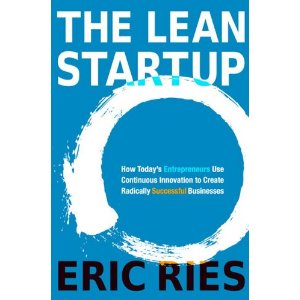Normally, I don't like to criticize someone else's content — particularly when it's from a source like FastCompany, which I respect and enjoy reading. But, today, I came across this article that talks about the values of the “Not-So-Lean” Startup. It caused a visceral reaction in me as I was reading it. Not that it didn't make a few good points (like the importance of sales and marketing and the value of inbound marketing and content creation), but it seemed that the author was attacking the lean startup method, popularized by Eric Ries in his best-selling book “The Lean Startup” without actually understanding it all that well. Also, I'm a self-proclaimed Lean Startup fanboy. [Note: The link to the book is an Amazon affiliate link. I donate all money I make from Amazon to non-profits — I figure the non-profits need the money more than Amazon does].
The following are some direct quotes from the article about the lean startup method and my reactions.
1. “In life and in business, failure can mean certain death, without a chance for another loop.”
Sure, failure can mean certain death — but one of the ideas behind the lean startup is to not only make loops short and fast, but try to maximize the odds that you can iterate enough times to get to product-market-fit.
2. “…another Riesian commandment that equates to plowing through "build-measure-learn" feedback loops until one discovers that special (and monetizable) moment when a product and its market interest collide.”
If you met Eric Ries or read what he's written, you'd know that he doesn't deliver commandments. He's scientific and thoughtful. He delivers ideas. He has a theories, and he argues for his theories — pretty well, I might add. To refer to a “Riesian commandment” misleads readers into thinking he's some arrogant know-it-all — which is simply not true.
3. “Indeed, too many startups have died (or are doomed to) by applying this method to their businesses, especially as their investors watch in horror.”
Really? How about some examples? Most startups die. How does the number of startups that have died (or are doomed) by applying the lean startup method compare to the number of startups that die because they didn't apply the method? By the way, as an angel investor myself (30+ startups), I will say that I am more “horrified” when I see startups not follow the lean startup model.
4. “you only get one shot to make a real splash with a product launch and truly impress the world, right?”
Actually, wrong. If your strategy is to bet it all on a single product launch and the hopes to get the magical ingredients “just right” to make that big splash and impress the world, odds are, you've already lost. In any case, it's at least sub-optimal. Why put so much emphasis on this “big bang” lauch model? Why not try and learn from early users, iterate and maximize the odds of market enthusiasm when you do think you're ready?
5. “Yes, the lean startup movement is correct in saying you shouldn’t throw wild parties and give Teslas to all your new employees--but isn’t that just common sense?”
Yes, that is indeed, common sense — but it has little to do with the lean startup. Once again, I will repeat, with emphasis, being lean is not about being cheap, it's about being fast. Every time I see someone make this msitake, I wonder if they're ever heard Eric speak or read the book.
6. “You can’t be a startup forever. And you shouldn’t want to. The lean startup model only offers tools to get you so far.”
Right. That may be why it's called the Lean Startup Model. The idea wasn't to come up with the grand unifying vision for all that is good and true in the universe. The reason the lean startup exists is to reduce the rate of startup failure and the related loss of human time and talent. I think it does that really well, and frankly, that's plenty of value right there.
Disclosure: I didn't realize until reading the early part of the article that the author of the article was Phil Fernandez (hi Phil!), someone I know and respect and who is the CEO of Marketo, a company in the marketing software industry. (My company, HubSpot is also in the same industry). Once I figured out it was Phil, I think I reduced my level of snarkiness. :)
So, what do you think? Did I over-react? Are my points misguided?